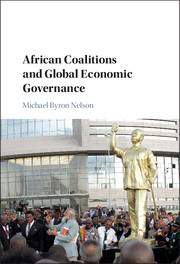2 - Institutional Systems
from PART I - THEORY AND BACKGROUND
Published online by Cambridge University Press: 05 September 2016
Summary
The structure of every legal order directly influences the distribution of power, economic or otherwise, within its respective community. This is true of all legal orders and not only that of the state.
– Max Weber, “Class, Status, Party”The structures of global governance lie at the heart of this book. They simultaneously work to shape the governance outcomes that matter to African states and their ability to strategically alter such outcomes. They mediate and determine the opportunities African states have to form, join, maintain, and use coalitions. Global governance is fragmented and incomplete. We have no world government, but we have a UN Security Council charged with maintaining global peace, a WTO that helps states regulate their trade relations with each other, and a host of other institutions that provide similar specialized functions, such as coordinating national patent regimes, encouraging human rights norms, providing development assistance, and monitoring the development of nuclear energy. There are varying legal structures in place at global, regional, and subregional levels. The resulting uneven landscape lacks coherence, creating an array of unique strategic challenges. All this matters for any country – or coalition of countries – that wishes to influence global governance.
There are a number of reasons to think that the experiences of coalitions working in and across international institutions will vary based on the institutional context. As Sonia Rolland points out, there is an established literature on how the strategies of American civil rights groups were shaped by the rights and access domestic institutions granted them. Their success varied from one institution (courts) to another (legislatures). While such experiences may not perfectly match those of groups of countries seeking to act collectively in international organizations, there are clearly parallels. As Rolland goes on to discuss, the WTO has rules that favor some types of groups (the European Union and LDCs) differently than others (the G-77). Narlikar's work shows how variations in institutional structures and voting rules – differences between the UN bodies that have majority voting and the consensus-driven GATT, for instance – have an impact on coalitions.
This chapter identifies a range of structures currently existing in global economic governance and their implications for African states and their coalitions.
- Type
- Chapter
- Information
- African Coalitions and Global Economic Governance , pp. 19 - 64Publisher: Cambridge University PressPrint publication year: 2016



